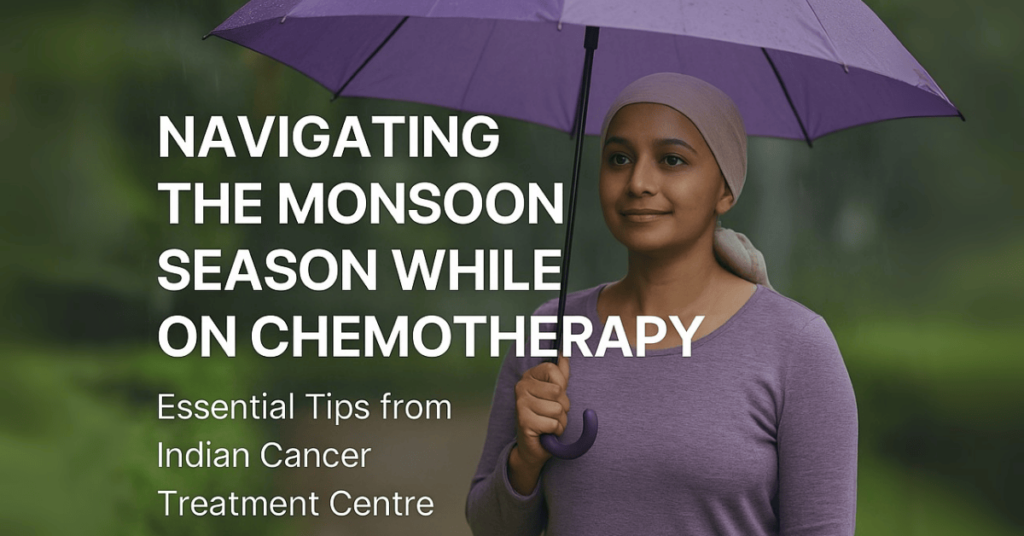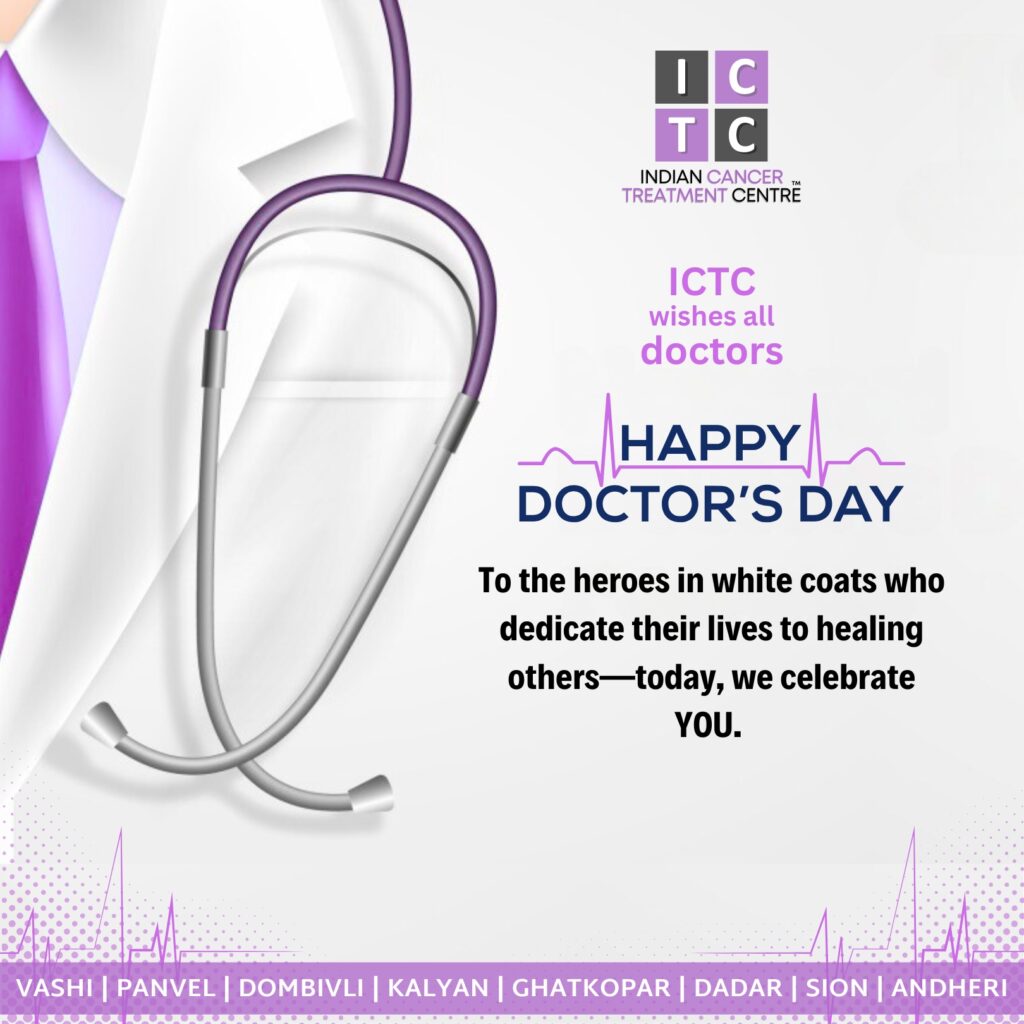How Early Diagnosis of Blood Cancer Improves Survival
How Early Diagnosis of Blood Cancer Improves Survival Blood cancer, also known as hematologic cancer, is one of the most challenging diseases in oncology. It originates in the bone marrow or blood cells and affects the production and function of red blood cells, white blood cells, and platelets. With types ranging from leukemia, lymphoma, to myeloma, blood cancer continues to be a major concern in India and worldwide. As a cancer treatment centre with over a decade of expertise in hematology and hemato-oncology, we can firmly say this—early detection of blood cancer is often the difference between life and death. At the Indian Cancer Treatment Centre (ICTC), our mission is to ensure timely diagnosis, personalized treatment, and compassionate care for every patient. The hematology department led by Dr. Kunal Goyal, widely recognized as one of the best hematologists in Mumbai, ICTC has successfully treated some of the most complex blood cancer cases in India. Why Early Detection of Blood Cancer is Crucial Blood cancer does not always present itself with obvious symptoms. Fatigue, frequent infections, night sweats, unexplained weight loss, and bruising are often dismissed as routine health issues. Unfortunately, by the time patients seek help, the disease has often progressed. Here’s why early detection can save lives: 1. Improved Treatment Outcomes: In the early stages, blood cancer cells are fewer in number and often respond better to chemotherapy, targeted therapy, or stem cell transplants. Early intervention reduces the risk of complications like organ damage and infections. 2. Expanded Treatment Options: Early diagnosis gives patients access to a wider range of treatment protocols, including advanced targeted therapies and immunotherapies. Delayed detection often limits treatment to aggressive regimens with higher side effects. 3. Higher Survival Rates: Studies consistently show that patients diagnosed early have significantly higher survival rates compared to those diagnosed at an advanced stage. For example, acute leukemia, when diagnosed early, responds much more favorably to treatment. 4. Better Quality of Life: Timely treatment allows patients to maintain a healthier lifestyle during therapy and reduces prolonged hospital stays. Early management helps patients and their families prepare emotionally, financially, and physically. ICTC – Redefining Hematology and Cancer Care At ICTC (Indian Cancer Treatment Centre), we believe in combining cutting-edge science with patient-centric care. Our dedicated hematology and hemato-oncology team focuses not just on treating cancer, but on transforming patient journeys into stories of survival and resilience. Take, for instance, our real-life success stories—like the case of a high-risk pregnant patient successfully managed under Dr. Kunal Goyal’s expert care. This reflects ICTC’s expertise in managing not only routine but also highly complex and rare hematology cases. https://www.youtube.com/watch?v=__e2JwaQ2jU Dr. Kunal Goyal – Leading the Fight Against Blood Cancer When patients search for the best hematologist in Mumbai, Dr. Kunal Goyal’s name stands out. With over 15 years of dedicated work in hematology and blood cancer, he has established himself as a trusted name in the field. Treatment usually involves surgery, sometimes combined with targeted chemotherapy or HIPEC (Hyperthermic Intraperitoneal Chemotherapy). Personalized treatment protocols are designed by experienced oncologists to achieve the top cancer treatment in India standards. Expertise: Specialized in leukemia, lymphoma, multiple myeloma, and bone marrow transplants. Reputation: Known for his precise diagnoses, evidence-based treatments, and compassionate approach. Patient-Centric Approach: Dr. Goyal takes time to educate patients and families, ensuring they understand their diagnosis and treatment options. Under his leadership, ICTC has become a hub for advanced hematology care in Mumbai, offering both medical excellence and human empathy. Common Signs of Blood Cancer You Shouldn’t Ignore While not all symptoms indicate cancer, being aware and seeking timely consultation from a hematologist is crucial: • Persistent fatigue or weakness• Recurrent fever or infections• Night sweats and unexplained weight loss• Easy bruising or bleeding gums• Enlarged lymph nodes or spleen If you or your loved ones experience these signs, don’t ignore them. Consulting an expert like Dr. Kunal Goyal at ICTC can make all the difference. ICTC’s Approach to Early Detection At ICTC, our hematology department emphasizes the importance of screening, advanced diagnostics, and patient education. We use state-of-the-art diagnostic tools such as flow cytometry, genetic testing, and bone marrow biopsies to ensure accurate and early detection. Our philosophy is simple—diagnose early, treat effectively, and support patients holistically. Conclusion Your Health, Our Mission Blood cancer is not always preventable, but its impact can be drastically reduced through early detection and timely treatment. At ICTC, we are committed to spreading awareness, offering world-class hematology care, and ensuring that no patient feels alone in their cancer journey. With experts like Dr. Kunal Goyal, recognized as one of the best hematologists in Mumbai, ICTC continues to lead in hemato-oncology and redefine patient care in India. If you or your loved ones have concerns about blood cancer symptoms, don’t wait—consult an expert hematologist today. Remember: Early detection doesn’t just save time—it saves lives. FAQ about Blood Cancer & Early Detection What is blood cancer? Blood cancer, also known as hematologic cancer, affects the production and function of blood cells in the bone marrow. Common types include leukemia, lymphoma, and multiple myeloma. What are the early warning signs of blood cancer? Persistent fatigue, frequent infections, unexplained weight loss, night sweats, and easy bruising are common early signs. If these symptoms last more than two weeks, consult a hematologist. Why is early detection of blood cancer important? Early detection allows for effective treatment, increases survival rates, expands therapy options, and improves quality of life during treatment. Who is the best hematologist in Mumbai for blood cancer? Dr. Kunal Goyal at ICTC – Indian Cancer Treatment Centre is regarded as one of the best hematologists in Mumbai, specializing in blood cancer and hemato-oncology with advanced treatment expertise. How is blood cancer diagnosed? Diagnosis typically involves blood tests, bone marrow biopsy, flow cytometry, and genetic testing. At ICTC, state-of-the-art diagnostic tools ensure accurate and timely results. Where can I get the top cancer treatment in India for blood cancer? Leading hospitals and cancer centers in Mumbai, Navi Mumbai, and Kalyan Dombivli offer world-class facilities and access to the best oncologists in India, ensuring
Navigating Monsoon Season While On Chemotherapy

Lorem ipsum dolor sit amet, consectetur adipisicing elit, sed do eiusmod tempor incididunt ut labore et dolore magna aliqua.
A Doctors’ Day Tribute to Our Oncologists and Cancer Specialists

A Doctors’ Day Tribute to Our Oncologists and Cancer Specialists This Doctors’ Day, we shine the spotlight on the ones who rarely ask for it — and remind every cancer doctor: you deserve care too. Every year, Doctors’ Day is a moment for the world to pause and express gratitude to the medical professionals who dedicate their lives to healing others. At ICTC – Indian Cancer Treatment Centre – we hold this day with even deeper reverence, especially for our oncologists, hematologists, and cancer care specialists. These are the warriors behind the scenes who guide patients and families through the most difficult diagnoses with resilience, empathy, and unmatched expertise. But amidst the constant focus on patients, it’s easy to forget that doctors are human too. They carry not just the weight of medical decisions but also the emotional toll of cancer journeys — often at the cost of their own well-being. This Doctors’ Day, we shine the spotlight on the ones who rarely ask for it — and remind every cancer doctor: you deserve care too. Tips for caring for yourself Eat Right. Eat On Time. Exercise, Even On-the-Go Sleep Like Your Patients Depend on It — Because They Do Balance the Stethoscope and Life Disconnect and Delegate Create Boundaries Between Work and Home Stay Organized to Stay Sane 1. Eat Right. Eat On Time. In the rush of back-to-back consultations and emergency calls, doctors often delay or skip meals. But fueling your body at the right time is non-negotiable. Prioritize regular meals to maintain energy and immune function. Stay hydrated — especially during long shifts. Keep quick, healthy snacks like fruits, nuts, or yogurt handy. Make a conscious effort to step away for lunch. Avoid late-night meals that disturb your sleep and digestion. A well-fed doctor isn’t just healthier — they’re sharper, more focused, and more emotionally present. 2. Exercise, Even On-the-Go You don’t need a gym. Just 5–10 minutes of movement in between duties can work wonders. Do simple chair stretches or neck/back/shoulder exercises between appointments. Take the stairs instead of the elevator. Park a little farther to add a few extra steps. Walk during breaks or take quick stair runs. These micro-movements ease stress, boost mood, and fight off fatigue. Movement is medicine — even for doctors. 3. Sleep Like Your Patients Depend on It — Because They Do Sleep deprivation impacts judgment, memory, and emotional regulation — all critical in cancer care. Aim for 7–9 hours of sleep — it’s not a luxury, it’s science-backed necessity. Create a sleep-conducive space: dark, quiet, and cool. Try tools like white noise apps, blackout curtains, or sleep trackers. Prioritize naps if you’re on irregular shifts. Well-rested doctors make fewer mistakes — and more meaningful connections. 4. Balance the Stethoscope and Life A life solely defined by medicine can feel hollow. Reconnecting with who you are outside the hospital helps refill your emotional reserves. Schedule check-ins with loved ones. Pursue hobbies or social outings that have nothing to do with work. Laugh with friends. Cook with family. Watch a movie. Let joy outside of work strengthen your spirit inside it. Remember, you can’t pour from an empty cup. 5. Disconnect and Delegate Even superheroes need a break. Rotate duties or shifts with a trusted colleague when needed. Designate no-work hours or no-phone zones at home. Practice digital detoxes, mindfulness, or even just quiet breathing. It’s okay to switch off. It’s not abandonment — it’s self-preservation. 6. Create Boundaries Between Work and Home Cancer care doesn’t have a time stamp — but doctors must. Learn to say “no” to extra commitments when your plate is full. Set after-hour boundaries for calls or messages unless critical. Create transition rituals — a change of clothes, music on the drive, a few minutes of silence — to shift mentally from doctor to self. Boundaries are not selfish. They’re survival. 7. Stay Organized to Stay Sane Juggling patient loads, reports, and research can overwhelm even the most seasoned oncologists. Use digital scheduling tools and to-do lists. Batch tasks and optimize your downtime. Streamline systems for patient management. Being organized doesn’t just save time — it protects mental clarity and reduces stress. On this Doctors’ Day, we at ICTC salute every cancer specialist — the medical oncologist who plans every line of chemo with precision, the hematologist who reads blood like poetry, the surgeon who balances every incision with compassion, and the palliative expert who walks with patients till the very end. But more than anything, we urge you to be what you tell your patients to be — gentle with yourself. Because when caregivers care for themselves, the entire system heals better. Happy Doctors’ Day to the true heroes in white. Team ICTC – Indian Cancer Treatment Centre

